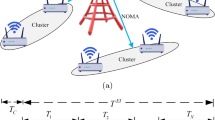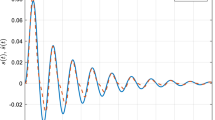Abstract
This paper investigates an event-triggered fusion estimation problem for a class of discrete-time nonlinear stochastic systems with unknown parameters and transmission fading over sensor networks (SNs). The system with unknown and bounded parameters is considered in this paper, which is more practical compared with traditional systems. The fading of local estimation information will occur during the remote transmission. Therefore, the objective of this paper is to design a new fusion method based on unknown parameters and faded local estimation information. With the help of Lyapunov-type analysis approaches and quadratic cost function, sufficient conditions are established to ensure the input-to-state stability (ISS) of the dynamics of estimation errors and obtain the bound of estimation errors in the mean square sense. Finally, an appropriate fusion estimation method is proposed to estimate both unknown parameters and system states. At last, an illustrative simulation is utilized to verify the feasibility of the proposed design scheme.
Similar content being viewed by others
References
B. Chen, W.-A. Zhang, and L. Yu, “Distributed finite-horizon fusion Kalman filtering for bandwidth and energy constrained wireless sensor networks,” IEEE Transactions on Signal Processing, vol. 62, no. 4, pp. 797–812, 2014.
X. Bian, Y. Xia, Z. Deng, and M. Fu, “One-channel networked data fusion with communication constraint,” Journal of the Franklin Institute, vol. 351, no. 1, pp. 156–173, 2014.
X. Ge, Q.-L. Han, M. Zhong, and X. M. Zhang, “Distributed Krein space-based attack detection over sensor networks under deception attacks,” Automatica, vol. 109, Article no. 108557, 2019.
H. R. Karimi, “Robust synchronization and fault detection of uncertain master-slave systems with mixed time-varying delays and nonlinear perturbations,” International Journal of Control, Automation, and, Systems, vol. 9, no. 4, pp. 671–680, 2011.
Z. Duan and X. Li, “Lossless linear transformation of sensor data for distributed estimation fusion,” IEEE Transactions on Signal Processing, vol. 59, no. 1, pp. 362–372, 2011.
X. Shen, Y. Zhu, and Z. You, “An efficient sensor quantization algorithm for decentralized estimation fusion,” Automatica, vol. 47, no. 5, pp. 1053–1059, 2011.
D. Guo, M. Zhong, and D. Zhou, “Multisensor data-fusion-based approach to airspeed measurement fault detection for unmanned aerial vehicles,” IEEE Transactions on Instrumentation and Measuremnt, vol. 67, no. 2, pp. 317–327, 2018.
Z. Wang, D. Wang, B. Shen, and F. Alsaadi, “Centralized security guaranteed filtering in multirate-sensor fusion under deception attacks,” Journal of The Franklin Institute-Engineering and Applied Mathematics, vol. 355, no. 1, pp. 406–420, 2018.
Y. Xia, J. Shang, J. Chen, and G. P. Liu, “Networked data fusion with packet losses and variable delays,” IEEE Transactions on Systems, Man, and Cybernetics-Part B: Cybernetics, vol. 39, no. 5, pp. 1107–1120, 2009.
Z. Ye, D. Zhang, and Z. Wu, “Adaptive event-based tracking control of unmanned marine vehicle systems with DoS attack,” Journal of the Franklin Institute, vol. 358, no. 3, pp. 1915–1939, 2021.
X. Ge, Q.-L. Han, X. M. Zhang, L. Ding, and F. Yang, “Distributed event-triggered estimation over sensor networks: A survey,” IEEE Transactions on Cybernetics, vol. 50, no. 3, pp. 1306–1320, 2020.
X. Ge, Q.-L. Han, and Z. Wang, “A threshold-parameter-dependent approach to designing distributed event-triggered H∞ consensus filters over sensor networks,” IEEE Transactions on Cybernetics, vol. 49, no. 4, pp. 1148–1159, 2019.
D. Ryu, C. Lee, S. Park, and M. Lim, “Unbiased FIR filtering with incomplete measurement information,” International Journal of Control, Automation, and Systems, vol. 18, no. 2, pp. 330–338, 2020.
D. Ding, Z. Wang, B. Shen, and H. Shu, “H∞ state estimation for discrete-time complex networks with randomly occurring sensor saturations and randomly varying sensor delays,” IEEE Transactions on neural networks and learning systems, vol. 25, no. 5, pp. 725–736, 2012.
X. Jiang and Q. Ling, “Event-triggered control for linear systems with model uncertainty and clock offset,” International Journal of Control, Automation, and Systems, vol. 18, no. 10, pp. 2552–2561, 2020.
W. Chen, D. Ding, X. Ge. Q.-L. Han, and G. Wei, “H∞ containment control of multiagent systems under event-triggered communication scheduling: The finite-horizon case,” IEEE Transactions on Cybernetics, vol. 50, no. 4, pp. 1372–1382, 2018.
D. Ding, Z. Wang, and Q.-L. Han, “A set-membership approach to event-triggered filtering for general nonlinear systems over sensor networks,” IEEE Transactions on Automatic Control, vol. 65, no. 4, pp. 1792–1799, 2020.
X. Ge, Q.-L. Han, L. Ding, Y. L. Wang, and X. M. Zhang, “Dynamic event-triggered distributed coordination control and its applications: A survey of trends and techniques,” IEEE Transactions on Systems, Man, and Cybernetics: Systems, vol. 50, no. 9, pp. 3112–3125, 2020.
Y. Ju, G. Wei, D. Ding, and S. Liu, “A novel fault detection method under weighted try-once-discard scheduling over sensor networks,” IEEE Transactions on Control of Network Systems, vol. 7, no. 3, pp. 1489–1499, 2020.
J. Li, G. Wei, D. Ding, and S. Zhang, “Event-triggered fault detection for switched systems with time-varying sojourn probabilities,” International Journal of Robust and Nonlinear Control, vol. 29, no. 18, pp. 6463–6482, 2019.
J. Cheng, J. H. Park, X. Zhao, H. R. Karimi, and J. Cao, “Quantized nonstationary filtering of network-based Markov switching RSNSs: A multiple hierarchical structure strategy,” IEEE Transactions on Automatic Control, vol. 65, no. 11, pp. 4816–4823, 2020.
D. Zhang, Z. Ye, P. Chen, and Q. Wang, “Intelligent event-based output feedback control with Q-learning for unmanned marine vehicle systems,” Control Engineering Practice, vol. 105, p. 104616, 2020.
M. Abu-Khalaf, and F. L. Lewis, “Nearly optimal control laws for nonlinear systems with saturating actuators using a neural network HJB approach,” Automatica, vol. 41, no. 5, pp. 779–791, 2005.
D. Ding, Z. Wang, Q.-L. Han, and G. Wei, “Security control for discrete-time stochastic nonlinear systems subject to deception attacks,” IEEE Transactions on Systems, Man, and Cybernetics-Part B: Cybernetics, vol. 48, no. 5, pp. 779–789, 2018.
G. Wei, L. Liu, L. Wang, and D. Ding, “Event-triggered control for discrete-time systems with unknown nonlinearities: An interval observer-based approach,” International Journal of Systems Science, vol. 51, no. 6, pp. 1019–1031, 2020.
Z. Wang, Y. Liu, and X. Liu, “H∞ filtering for uncertain stochastic time delay systems with sector-bounded nonlinearities,” Automatica, vol. 44, no. 5, pp. 1268–1277, 2007.
D. Ding, Q.-L. Han, X. Ge, and J. Wang, “Secure state estimation and control of cyber-physical systems: A survey,” IEEE Transactions on Systems, Man, and Cybernetics-Systems, vol. 51, no. 1, pp. 176–190, 2021.
J. Mao, Y. Sun, X. Yi, H. Liu, and D. Ding, “Recursive filtering of networked nonlinear systems: A survey,” International Journal of Systems Science, vol. 52, no. 6, pp. 1110–1128, 2021.
F. Li, L. Gao, G. Dou, and B. Zheng, “Dual-side event triggered output feedback H∞ control for NCS with communication delays,” International Journal of Control, Automation, and Systems, vol. 16, no. 1, pp. 108–119, 2018.
J. Zhang, Y. Xia, and P. Shi, “Parameter-dependent robust H∞ filtering for uncertain discrete-time systems,” Automatica, vol. 45, no. 2, pp. 560–565, 2009.
G. Wei, Z. Wang, and H. Shu, “Robust filtering with stochastic nonlinearities and multiple missing measurements,” Automatica, vol. 45, no. 3, pp. 836–841, 2009.
L. Xu, K. Ma, and H. Fan, “Unscented Kalman filtering for nonlinear state estimation with correlated noises and missing measurements,” International Journal of Control, Automation, and Systems, vol. 16, no. 3, pp. 1011–1020, 2018.
B. Chen, W. A. Zhang, and L. Yu, “Distributed fusion estimation with missing measurements, random transmission delays and packet dropouts,” IEEE Transactions on Automatic Control, vol. 59, no. 7, pp. 1961–1967, 2014.
B. Shen, Z. Wang, H. Shu, and G. Wei, “Robust H∞ finite-horizon filtering with randomly occurred nonlinearities and quantization effects,” Automatica, vol. 46, no. 11, pp. 1743–1751, 2010.
H. Dong, Z. Wang, and H. Gao, “Distributed filtering for a class of time-varying systems over sensor networks with quantization errors and successive packet dropouts,” IEEE Transactions on Signal Processing, vol. 29, no. 5, pp. 3164–3173, 2012.
J. Liang, Z. Wang, and X. Liu, “Distributed state estimation for discrete-time sensor networks with randomly varying nonlinearities and missing measurements,” IEEE Transactions on Neural Networks, vol. 22, no. 3, pp. 486–496, 2011.
Y. Ju, G. Wei, and D. Ding, S. Liu, “Finite-horizon fault estimation for time-varying systems with multiple fading measurements under torus-event-based protocols,” International Journal of Robust and Nonlinear Control, vol. 29, no. 13, pp. 1594–4608, 2020.
J. Cheng, Y. Shan, J. Cao, and J. H. Park, “Nonstationary control for T-S fuzzy Markovian switching systems with variable quantization density,” IEEE Transactions on Fuzzy Systems, vol. 29, no. 6, pp. 1375–1385, 2021.
B. Li, Z. Wang, Q.-L. Han, and H. Liu, “Input-to-state stabilization in probability for nonlinear stochastic systems under quantization effects and communication protocols,” IEEE Transactions on Cybernetics, vol. 49, no. 9, pp. 3242–3254, 2019.
Author information
Authors and Affiliations
Corresponding author
Additional information
This work was supported in part by the National Natural Science Foundation of China under Grant 61873169.
Yeming Shi received his B.Sc. degree in mathematics and applied mathematics from Hefei Normal University, Hefei, China, in 2017. He is currently pursuing an M.Sc. degree from College of Science, University of Shanghai for Science and Technology, Shanghai, China. His research interests include nonlinear systems, fusion estimation, as well as sensor networks.
Guoliang Wei received his B.Sc. degree in mathematics from Henan Normal University, Xinxiang, China, in 1997 and an M.Sc. degree in applied mathematics and a Ph.D. degree in control engineering, both from Donghua University, Shanghai, China, in 2005 and 2008, respectively. He is currently a Professor with the the College of Science, University of Shanghai for Science and Technology, Shanghai. From 2010 to 2011, he was an Alexander von Humboldt Research Fellow with the Institute for Automatic Control and Complex Systems, University of Duisburg-Essen, Duisburg, Germany. From 2009 to 2010, he was a Post-Doctoral Research Fellow with the Department of Information Systems and Computing, Brunel University London, Uxbridge, U.K., sponsored by the Leverhulme Trust of the U.K. He was a Research Assistant with the University of Hong Kong, Hong Kong, for two months, in 2007 and with the City University of Hong Kong, Hong Kong, for two months, in 2008. He has published over 50 papers in refereed international journals. His current research interests include nonlinear systems, stochastic systems, and bioinformatics. He is a very active reviewer for many international journals.
Derui Ding received his B.Sc. degree in industry engineering and an M.Sc. degree in detection technology and automation equipment from Anhui Polytechnic University, Wuhu, China, in 2004 and 2007, respectively, and a Ph.D. degree in control theory and control engineering from Donghua University, Shanghai, China, in 2014. From July 2007 to December 2014, he was a Teaching Assistant and then a Lecturer with the Department of Mathematics, Anhui Polytechnic University. He is currently a Senior Research Fellow with the School of Software and Electrical Engineering, Swinburne University of Technology, Melbourne, VIC, Australia. From June 2012 to September 2012, he was a Research Assistant with the Department of Mechanical Engineering, University of Hong Kong, Hong Kong. From March 2013 to March 2014, he was a Visiting Scholar with the Department of Information Systems and Computing, Brunel University London, Uxbridge, U.K. He has published around 40 papers in refereed international journals. His research interests include nonlinear stochastic control and filtering, as well as multi-agent systems and sensor networks. He is serving as an Associate Editor for Neurocomputing and IET Control Theory & Application. He is also a very active reviewer for many international journals.
Publisher’s Note
Springer Nature remains neutral with regard to jurisdictional claims in published maps and institutional affiliations.
Rights and permissions
About this article
Cite this article
Shi, Y., Wei, G. & Ding, D. Event-triggered Fusion Estimation for Nonlinear Stochastic System with Unknown Parameters and Transmission Fading Over Sensor Networks. Int. J. Control Autom. Syst. 20, 1405–1417 (2022). https://doi.org/10.1007/s12555-020-0756-3
Received:
Revised:
Accepted:
Published:
Issue Date:
DOI: https://doi.org/10.1007/s12555-020-0756-3




